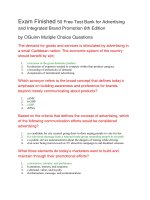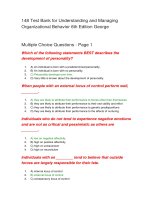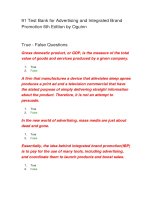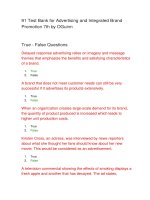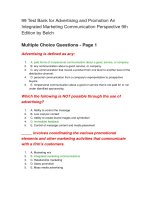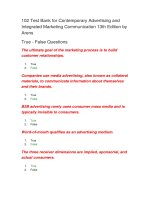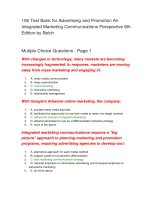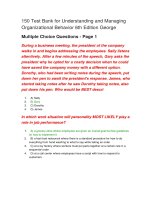91 test bank for advertising and integrated brand promotion 6th edition by oguinn
Bạn đang xem bản rút gọn của tài liệu. Xem và tải ngay bản đầy đủ của tài liệu tại đây (141.5 KB, 21 trang )
91 Test Bank for Advertising and Integrated Brand
Promotion 6th Edition by Oguinn
True - False Questions
Gross domestic product, or GDP, is the measure of the total
value of goods and services produced by a given
company.
1.
2.
True
False
A firm that manufactures a device that alleviates sleep apnea
produces a print ad and a television commercial that
have the stated purpose of simply delivering straight
information about the product. Therefore, it is not an
attempt to persuade.
1.
2.
True
False
In the new world of advertising, mass media are just about
dead and gone.
1.
2.
True
False
Essentially, the idea behind integrated brand promotion(IBP)
is to pay for the use of many tools, including
advertising, and coordinate them to launch products
and boost sales.
1.
2.
True
False
A well-known computer manufacturer runs a worldwide
advertising campaign for its desktops, laptops,
notebooks, and other computer equipment in an
attempt to provide a common theme and presentation
in all markets including consumers in North America,
Europe, Asia, Africa, Australia and South America. This
is an example of an international advertising
campaign.
1.
2.
True
False
Today, unlike years past, if a company produces and
disseminates enough digital, mobile, online, and even
traditional advertising for its offering, even a brand
that does not meet consumers needs can succeed.
1.
2.
True
False
Brad Pitt is interviewed on the red carpet walk to the
Academy Awards about his latest movie, for which he
has been nominated for an Oscar. TV cameras and
reporters zoom in to catch his comments. This is a
form of advertising.
1.
2.
True
False
Consumers’ perceptions can be based on tangible
differences or on image and style factors with brand
differentiation.
1.
2.
True
False
The marketing mix involves four areas of responsibility—
conceiving, pricing, promoting, and distributing—
involved in the promotion of goods, services, or even
ideas.
1.
2.
True
False
Government buyers are the most conspicuous audience
today, in that most mass media advertising is directed
at them.
1.
2.
True
False
Emphasizing performance features of a product through
advertising is rarely enough to create a difference in
the mind of the consumer between an organization’s
brands and its competitors.
1.
2.
True
False
The company or organization that pays for an advertisement
is referred to as the client or sponsor.
1.
2.
True
False
Nowadays, advertising is virtually the only promotional tool
that is used to attract, impress, and persuade
consumers.
1.
2.
True
False
A producer of educational materials wants to deliver an
advertising message to a professional audience of
teachers, principals, and school administrators. In this
case, a trade journal would not be an appropriate
medium to use.
1.
2.
True
False
To survive in today’s marketplace, contemporary businesses
and organizations are strongly focusing on one single
concept—communication.
1.
2.
True
False
A late-night television commercial for kitchen knives urges
viewers to “call this toll-free number in the next 30
minutes to receive a free cutting board” and assures
them that “operators are on duty.” This is an example
of a direct response ad.
1.
2.
True
False
When an organization creates large-scale demand for its
brand, the quantity of product produced is increased,
and unit production costs increase.
1.
2.
True
False
The marketers at Apple use a number of communication
methods—including advertising in many forms of
media, personal selling, public relations, event
sponsorship,corporate advertising, social networking,
and point-of-purchase, among others—in a
coordinated process to build and maintain brand
exposure. The Apple promoters are demonstrating a
form of integrated brand promotion (IBP).
1.
2.
True
False
The fundamental purpose of marketing (and the advertising
that is used in marketing) is to generate revenue.
1.
2.
True
False
One ongoing change in today’s promotions can be seen in
the way that the lines between information,
entertainment, networking, and commercial messages
are blurring.
1.
2.
True
False
Advertising is only one area of the marketing mix, and it
represents only one of many different IBP tools used in
the marketing mix.
1.
True
2.
False
A large retail chain sells groceries through its stores in 31
Western, Northwestern, Midwestern, and Southern
states. However, it would not use national advertising
to reach its target market.
1.
2.
True
False
In some indirect ways, advertising can affect gross domestic
product. It acts to increase product demand when it
helps to introduce new products, thereby increasing
sales, which in turn affects GDP.
1.
2.
True
False
Essentially, the difference between value and symbolic value
is that the first term refers to ads aimed at consumers,
and the second term refers to ads aimed at
businesses.
1.
2.
True
False
When a brand is perceived by consumers as providing some
form of satisfaction that is beyond the cost to
purchase the brand, it is said to have brand equity.
1.
2.
True
False
Organizations that have tried to stimulate primary demand in
mature product categories have had considerable
success.
1.
2.
True
False
Mass-mediated communication has three major
components: production, reception and distribution.
1.
2.
True
False
In the advertising industry, the term social meaning refers to
the perception by consumers that a brand provides
satisfaction that is greater than the cost incurred to
acquire the product or service.
1.
2.
True
False
Delayed response advertising attempts to develop
recognition and approval of a brand over time, relying
on imagery and message themes that emphasize the
benefits and satisfying characteristics of a brand.
1.
2.
True
False
A brand variant is created when a company adapts and
expands its current brand into a totally new product
area.
1.
2.
True
False
A commercial created by the Partnership for a Drug-Free
America shows eggs dropping into a frying pan, with
the caption, “This is your brain on drugs.” It is aired on
three major television networks for free. Though this
sounds like a public service message, it is actually an
advertisement.
1.
2.
True
False
All the consumers who ultimately see an advertisement or an
advertising campaign are considered its target
audience.
1.
2.
True
False
A kitchen appliance manufacturer attempts to create a
distinctive competitive position based on design
features, pricing, distribution, and promotion or
advertising strategy. In this way, the company is
making an external-positioning decision.
1.
True
2.
False
The set of assets linked to a brand that is built over time—
such as its name, symbol, logo, etc.—is considered its
brand equity.
1.
2.
True
False
A single ad—or a series of coordinated ads with a similar
look, feel, and message—that revolves around one
consistent theme is called a promotion.
1.
2.
True
False
Mutiple Choice Questions
In the model of mass-mediated communication, the
1.
2.
3.
4.
a.producers of the message control the reception of the content.
b.producers of the message control the interpretation of the content.
c.audience members can interpret advertising any way they want.
d.audience members interpret information the same way.
The reality of today’s promotions, beyond all else, centers
around a strong emphasis on the
1.
2.
3.
4.
a.communication.
b.corporation.
c.media.
d.brand.
The mayor of a midsize Southern city appears on local
television, saying that she should be re-elected
because she has brought jobs to the metropolitan
area. Obviously, this effort is mass-mediated and is an
attempt to persuade. But for it to be considered
advertising, which other condition must be met?
1.
2.
3.
4.
a.The message must be received by a target audience.
b.There must be a public service announcement included.
c.The airtime must be paid for.
d.The claim must involve a product or service.
Based on the criteria that defines the concept of advertising,
which of the following communication efforts would be
considered advertising?
1.
2.
3.
4.
a.a candidate for city council going door-to-door urging people to vote for her
b.a television message from a national trade group reminding people to eat pork
c.a public service announcement about the dangers of texting while driving
d.an actor being interviewed on TV about his campaign to aid disabled veterans
A critic of advertising tells you that the costs of advertising
are built into the costs for products, which are then
passed on to the consumer. You have decided to argue
the issue. You can make many points, but which
argument should you not present?
1.
a.The increased demand for products that results from advertising can lower the
cost of the production of the products.
2. b.Economies of scale spread fixed costs over a large number of production units.
3. c.The cost of advertising is usually not built into the cost of products.
4. d.This must be balanced against the time it would take a person if he or she had to
search for information about products without advertising.
Which of the following is an example of international
advertising?
1.
2.
3.
4.
a.Gatorade promoting its new line of six-pack drinks at the Olympics
b.Sony advertising its flat-screen TVs around the world
c.Procter & Gamble creating different versions of its Tide ad for various countries
d.Nike featuring its “swish” logo on gear worn by tennis players at Wimbledon
When the advertising of Brandmoor’s, a regional department
store, is created to encourage and maintain brand
loyalty, it supports successful price increases.
Economists would call this department store’s
strategy an example of
1.
2.
3.
4.
a.direct response advertising.
b.selective demand stimulation.
c.primary demand stimulation.
d.inelasticity of demand.
The advertising for a snow blower points out a brand’s
unique benefits compared to the snow blowers offered
by the competition. This is known as
1.
2.
a.selective demand stimulation.
b.primary demand stimulation.
3.
4.
c.corporate advertising.
d.direct response advertising.
A manufacturer of a new electronic device launches a
campaign to create demand for the entire product
category, since it is new to the public. This is known
as
1.
2.
3.
4.
a.selective demand stimulation.
b.latent demand stimulation.
c.elastic demand stimulation.
d.primary demand stimulation.
EarthWorld, a manufacturer of camping gear and apparel,
sells several lines of sleeping bags that are very
similar to each other. The company does not want one
line of sleeping bags to steal market share from the
others. To protect against this, EarthWorld must be
concerned with the effective use of
1.
2.
3.
4.
a.economies of scale.
b.internal positioning.
c.primary demand stimulation.
d.institutional advertising.
A greeting card manufacturer runs a commercial indicating
that people who receive greeting cards appreciate
them much more when they see its company name on
the back. This is an example of a company focusing
on
1.
2.
3.
4.
a.symbolic value.
b.direct response.
c.primary demand stimulation.
d.mobile marketing.
YouTrade, an online broker, purchases a 60-second
television commercial to be telecast during the Major
League playoffs and the World Series. The commercial
touts the reliability of YouTrade’s advice, expertise,
and personal attention in assisting Internet customers
with stock portfolio creation and management. The
spot created by YouTrade is
1.
2.
a.not an advertisement since it does not involve a product.
b.a promotion aimed at a trade channel.
3.
4.
c.an unpaid public service announcement.
d.an advertisement promoting a service.
A manufacturer creates massive demand for its new plastic
sandal and greatly increases its production level. Over
time, its high-volume production brought on by
demand stimulation results in lower costs. This is an
example of
1.
2.
3.
4.
a.inelasticity of demand.
b.economies of scale.
c.brand loyalty.
d.symbolic value.
What type of advertising communicates the specific features,
values, and benefits of a product offered by a
particular company?
1.
2.
3.
4.
a.internal advertising
b.corporate advertising
c.brand advertising
d.institutional advertising
During the NCAA championships, a national sports
equipment manufacturer runs an edgy, fast-paced
commercial featuring a well-known hip hop artist. A
group of guys watching in a fraternity house seem to
interpret the commercial in roughly the same way.
When members of an audience share a similar
interpretation of an ad like this, it is most likely the
result of the
1.
2.
3.
4.
a.backgrounds and value systems of audience members.
b.frequency of the commercial.
c.content of the commercial.
d.characteristics of the product being advertised.
Which of the following would be considered a trade journal?
1.
2.
3.
4.
a.a financial publication like The Wall Street Journal
b.a publication written for health professionals like Nursing
c.a magazine aimed at fitness enthusiasts like Runners World
d.a metropolitan newspaper like The Boston Globe
The American Academy of Pediatrics (AAP) wants to launch
a message to inform citizens about dangerous crib
structures and recalled products. It hires a firm called
American Message, which has expertise in working
with nonprofit organizations, to create a series of
television commercials around this primary theme.
There is no charge for airtime on the many syndicated
networks on which the ad will be broadcast. In this
instance,
1.
2.
3.
a.the AAP is considered the client because it hired an agency.
b.the syndicated networks are considered the trade channel.
c.American Message is considered the sponsor because the AAP is a nonprofit
organization.
4. d.the AAP is running a public service announcement.
When consumers are brand loyal, the term inelasticity of
demand is often used. This means that
1.
2.
3.
4.
a.consumers won’t accept price increases for a particular product category.
b.consumers are less sensitive to price increases for a brand they like.
c.firms have the flexibility to lower prices if this will increase sales.
d.firms may decrease production in order to increase demand.
A marketer has been given the task of monitoring all the
elements of the marketing mix for a large Oregon
winery. He has many responsibilities, but one aspect
that he is not concerned with is the ____ of the
winery’s products.
1.
2.
3.
4.
a.production
b.conception
c.pricing
d.promotion
A furniture retailer establishes itself in the Pacific Northwest
with massive stores in Seattle and Portland. Over the
years it expands into the West and Northwest, with
large outlets in Billings, Fargo, and Denver. Its
promotions throughout these locations would be
considered ____ advertising.
1.
2.
3.
a.national
b.corporate
c.business-to-business
4.
d.regional
Products that signify a certain class membership for those
who purchase them—or hope to purchase them—are
said to carry a certain level of ____ with their name and
brand.
1.
2.
3.
4.
a.symbolic value
b.social meaning
c.differentiation
d.brand equity
A medical equipment supplier is targeting a number of
healthcare professionals (doctors, nurses, physical
therapists) with its latest advertising. This firm should
be aware that the advertising is attempting to reach an
audience that
1.
2.
3.
4.
a.has little real purchasing power within this industry.
b.can best be found through general interest magazines.
c.has the same broad and generalized needs as the rest of the population.
d.relies on specific language, images, and terminology.
A husband and wife are watching a cable news program
when a commercial comes on that they’ve never seen
before. He thinks that the spokesperson in the ad is
pretty funny. She thinks the spokesperson is just plain
stupid. This is an example of
1.
2.
3.
4.
a.the creation of different meanings based on social and cultural context.
b.a failure to reach a target audience.
c.an ad that is not effective.
d.one person not exercising intent of interpretation.
By about 1990, the idea of combining various promotional
tools came to be known as ____, though over the past
two decades this phrase has shifted and evolved,
giving way to a new term.
1.
2.
3.
4.
a.integrated marketing communications
b.marketing mix
c.integrated brand promotion
d.economies of scale
As the holidays approach, corporate advertising is placed in
a trade channel by large retailers such as JCPenney,
Macy’s, Sears, and Dillard’s.Their main objective is to
get people into their stores and get into the mood to
shop rather than to look for a particular item or brand.
This is an example of ____ advertising.
1.
2.
3.
4.
a.institutional
b.direct response
c.external
d.professional
Public service announcements (PSAs)
1.
2.
3.
4.
a.are a type of advertising run by nonprofit organizations.
b.use copy and visuals in ways very different from traditional advertising.
c.attempt only to inform and not necessarily to persuade.
d.are not paid for like an ad.
A brand of soup is perceived by consumers as a “good
deal,” one that provides a certain level of comfort and
satisfaction that goes well beyond just the money it
takes to purchase a few cans. In this way, the soup is
said to have
1.
2.
3.
4.
a.demand stimulation.
b.inelastic demand.
c.positioning.
d.value.
Which slogan is an example of corporate advertising rather
than brand advertising?
1.
2.
3.
4.
a.“Mmm-mmm good” (Campbell’s)
b.“The quicker picker-upper” (Bounty)
c.“Snap! Crackle! Pop!” (Kellogg)
d.“We bring good things to life” (General Electric)
A family-owned butcher shop has expanded to four locations
within the St. Louis metropolitan area and suburbs,
running regular promotions in the daily editions of The
Kansas City Star. These newspaper ads forms of ____
advertising.
1.
2.
3.
a.local
b.trade
c.regional
4.
d.cooperative
KidsCause, a metropolitan outreach organization that
collects and donates toys for needy children, buys
airtime on WXXY (a local TV station) to promote its
annual toy collection. Amazing Ads, a local ad agency,
shoots the video and produces the 30-second
commercial and Downtown Deli donates sandwiches
for volunteers on the days they collect, wrap, and
distribute toys. In this promotional effort, who is the
client?
1.
2.
3.
4.
a.Amazing Ads
b.Downtown Deli
c.WXXY
d.KidsCause
When national companies and local merchants share
advertising expenses, they are taking part in ____
advertising.
1.
2.
3.
4.
a.external
b.local
c.cooperative
d.selective
What is the term for the effort to create a perceived
distinction between an organization's brand and the
competition's brand?
1.
2.
3.
4.
a.internal positioning
b.external positioning
c.market segmentation
d.differentiation
Integrated brand promotion (IBP) is
1.
a.closely monitored and regulated on a federal level by the Federal Trade
Commission.
2. b.the coordination of a number of promotional tools to create widespread brand
exposure.
3. c.the use of more than one media format to deliver a commercial message.
4. d.a unique concept mainly seen in national advertising campaigns.
A particular group of consumers that is singled out by an
organization for its advertising or IBP campaign is
called a(n)
1.
2.
3.
4.
a.target audience.
b.trade channel.
c.household.
d.organization.
The demand for goods and services is stimulated by
advertising in a small Caribbean nation. The economic
system of the country should benefit by a(n)
1.
2.
3.
4.
a.increase in the gross domestic product.
b.reduction of expenses needed to compete within that product category.
c.lessening of inelasticity of demand.
d.expansion of institutional advertising.
Market segmentation is the process of
1.
a.creating a perceived difference between the brand of one firm and the brand of a
competitor.
2. b.adding a level of value and meaning to a product’s identity.
3. c.breaking down a large heterogeneous market into homogeneous submarkets.
4. d.identifying a competitive niche for a brand.
It is evident that firms have not fully exploited all the
opportunities that ____ marketing has to offer via
communication through devices like smartphones and
digital tablet-like devices.
1.
2.
3.
4.
a.direct
b.mobile
c.local
d.trade channel
A marketing manager for a giant beverage firm has been put
in charge of all advertising for a new soft drink that
appears to have a common appeal in different cultures
around the world. This manager will most likely
engage in
1.
2.
3.
4.
a.national advertising.
b.international advertising.
c.multicultural advertising.
d.global advertising.
For a communication to be classified as advertising, which
of the following criteria does not have to be met?
1.
2.
3.
4.
a.It must be paid for.
b.It must be mass-mediated rather than face-to-face.
c.It must promote a product.
d.It must attempt to persuade.
Farm Fresh Market, a local grocery store chain, has decided
to run a series of advertisements. For this to be
considered an advertising campaign, the Farm Fresh
Market ads must
1.
2.
3.
4.
a.focus on store products rather than store services.
b.target a number of segmented audiences.
c.appear in multiple forms of media.
d.communicate a cohesive and integrated idea or theme.
The attempt to develop brand awareness and preference
over time, as well as emphasize the benefits of using
that brand is called
1.
2.
3.
4.
a.delayed response advertising.
b.selective demand stimulation.
c.corporate advertising.
d.primary demand stimulation.
A marketer is asked to analyze her company’s advertising
industry expenditures by target market. She wants to
start with the broad market that is most often selected
by advertisers. She begins her work by looking at
1.
2.
3.
4.
a.members of trade channels.
b.government employees.
c.professionals.
d.household consumers.
Which acronym refers to the broad concept that defines
today’s emphasis on building awareness and
preference for brands, beyond merely communicating
about products?
1.
2.
3.
4.
a.IMC
b.GDP
c.IBP
d.PSA
What are the two major components of the mass-mediated
communication model, each representing a somewhat
independent process?
1.
2.
3.
4.
a.primary demand and selective demand
b.advertiser and consumer
c.internal position and external position
d.production and reception
The advertising aimed at government officials and
bureaucrats who have big budgets to spend usually
centers around
1.
2.
3.
4.
a.local and regional television commercials.
b.pitches in national magazines and city trade journals.
c.direct mail, catalogs, and Web ads.
d.public relations promotions.
Effective ________ positioning is accomplished by either
developing vastly different products within the firm’s
own product line or creating advertising messages
that appeal to different consumer needs and desires.
1.
2.
3.
4.
a.external
b.crossc.perceptual
d.internal
Which of the following is the result of a company creating a
brand extension?
1.
a.a public service announcement run by the NFL during Monday Night Football
telecasts
2. b.a new type of dog collar advertised in Dog World and other magazines for pet
owners
3. c.a women’s fragrance imitating a popular Calvin Klein cologne
4. d.a candy bar created with Oreos and launched by Nabisco
A well-known manufacturer of office machines needs to hire
a new product manager for its line of high-end copying
machines for office use. The human resources
associate is aware that the new manager she hires will
most likely need to
1.
2.
3.
4.
a.rely on consumer advertising to reach as many people as possible.
b.use both personal selling and advertising.
c.eliminate government organizations as a potential target market.
d.ignore not-for-profit businesses.
Which of the following is true regarding advertising?
1.
2.
3.
a.Advertising is a universal communication beyond language and culture.
b.Advertising has as its main responsibility the increase of product sales.
c.Advertising plays a pivotal role in world commerce and the way we experience
life.
4. d.Advertising rarely generates revenue.
What three elements do today’s marketers want to build and
maintain through their promotional efforts?
1.
2.
3.
4.
a.awareness, identity, and preference
b.attention, interest, and response
c.demand, value, and loyalty
d.information, message, and communication
Free Text Questions
A brand is greatly shaped and impacted by advertising in
five important ways. Name at least three of these ways
that advertising influences brand management, and
explain briefly.
Answer Given
Advertising can affect a brand in five broad ways: By informing and persuading -using message to inform or persuade audiences about values and benefits of the
brand By introducing new brands or brand extensions -- getting the word out about
new goods or services, or adaptations of current goods or services By building
and maintaining loyalty among consumers -- aiming at repeat purchases of the
brand by the consumer to the exclusion of other brands By creating an image and
meaning for a brand -- describing how a brand not only fulfills needs and desires,
but is linked to the larger social or cultural environment By building and
maintaining brand loyalty within the trade -- gaining support from those who
distribute and sell the product to favor the brand over all others in their handling,
delivery, and display of the product
Consider the various types of advertising and the ways that
advertising messages can be categorized. Then
explain in a few words how the following marketing
concepts help to categorize advertising into various
types: primary demand stimulation versus selective
demand stimulation,direct response advertising
versus delayed response advertising, and corporate
advertising versus brand advertising.
Answer Given
Advertising can be categorized by these three sets of criteria depicting
fundamental approaches to communication: Primary demand stimulation is an
attempt to create demand for an entire product category, a costly process that is
often used for launching totally new innovations or inventions on the market.
Selective demand stimulation points out the brand’s unique benefits compared to
those of competing products or services. Direct response advertising asks
consumers to act now, to make the purchase immediately. Delayed response
advertising develops awareness and preference for a brand over time.Corporate
advertising communicates a favorable view toward a business or organization as a
whole. Brand advertising communicates specific values, features, and benefits of
a specific product or service offered by the business or organization.
What is an audience? A target audience? Of the five broad
audience categories that are commonly used in
advertising, name as many as you can, and add a very
brief description of each.
Answer Given
An audience is a group of individuals—any large group of people—who receive
and interpret messages sent from companies and organizations. A target audience
is a certain group of individuals or consumers who are singled out by a business
or organization for its ad or IBP campaign, usually because they are known to like
the product category and may be attracted by this particular brand within that
category. However, they are always considered as only a potential audience
because it cannot be guaranteed that the message actually gets through to them
as intended. Five broad audience categories are commonly used in advertising:
Household consumers. Ordinary members of the population, grouped by
household, are the most conspicuous audience because most mass media
advertising is directed at them; Members of business organizations. People who
represent businesses are targeted by advertising for business and industrial goods
and services, office equipment and supplies, and computer hardware and
software; Members of trade channels. Retailers, wholesalers, and distributors are
targeted by producers of household and business goods and services;
Professionals. Specialized target audiences are made up of doctors, lawyers,
accountants, teachers, and others belonging to professional groups that require
special training or certification, and therefore have specialized needs and
interests; Government officials and employees. Federal, state, and local
bureaucrats and other employees make up a target category largely due to the
massive amount of spending and purchasing involved in running government
departments and services.
What is the definition of a brand? Why is so much emphasis
put on “brands” and “branding” in today’s marketing?
Answer Given
A brand is a name, term, sign, symbol, or any other feature that identifies one
seller’s goods or service as different and distinct from those offered by other
sellers. Today’s advertising and promotion put significant emphasis on creating,
developing, and communicating about their brands because a brand represents
the image and identity of the organization. In many ways, a brand is the most
valuable and the precious business asset owned by a company, because it allows
an organization to communicate efficiently and consistently within the
marketplace. A brand can be at a serious disadvantage in the competitive
marketplace if it doesn’t have effective advertising to identify and promote it.
What is advertising? Give a brief definition. What are the
three criteria that must be met for a communication to
be considered an advertisement? How does a public
service announcement differ from advertising in the
ways that it meets, or fails to meet, each of these
criteria? What about a publicity event or other public
relations effort?
Answer Given
Advertising is a paid attempt to reach often large numbers of people through mass
media, a communication from a company or organization that wants to persuade a
population by having its message disseminated. The three criteria that must be
met for a communication to be considered an advertisement are that it must be
paid for, it must be mass mediated, and it must be an attempt to persuade. A
public service advertisement is mass mediated and an attempt to persuade.
However, by definition, a public service announcement is not paid for and cannot
be considered advertising. A public relations effort in the form of a publicity event,
like a celebrity promoting his latest movie on a talk show, also attempts to
persuade and uses mass media, but it is not paid for so is not advertising.
Define and briefly explain the concepts of market
segmentation, differentiation, and positioning.
Answer Given
Advertising can help a firm by providing each of these aspects. Market
segmentation is the process of breaking down a large and widely varied market (a
heterogeneous market) into many smaller sub-markets or segments
(homogeneous markets) based on certain consumer characteristics. Its strategy is
based on the supposition that consumers have many wants, differ among each
other regarding their wants, and can change their wants based on various
circumstances. It identifies various segments of the population that, for various
reasons, want to buy certain goods or services. Differentiation is the process of
creating in the mind of the consumer the perception of a clear difference -whether concrete and tangible, or emotional and intangible -- between an
organization’s brand and that of its competitors. Its strategy revolves around the
emphasis on having the consumer perceive a difference between brands, of
course referring to a positive difference for the organization’s brand. Positioning is
the process of designing a brand so it can occupy a distinct and valued place in
the consumer’s mind and communicating this distinction to the consumer. Its
strategy revolves around the perceptual space created in the minds of consumers
that encompasses all possible brands they might consider purchasing, and giving
the brand a prominent position in that space when compared with others.
